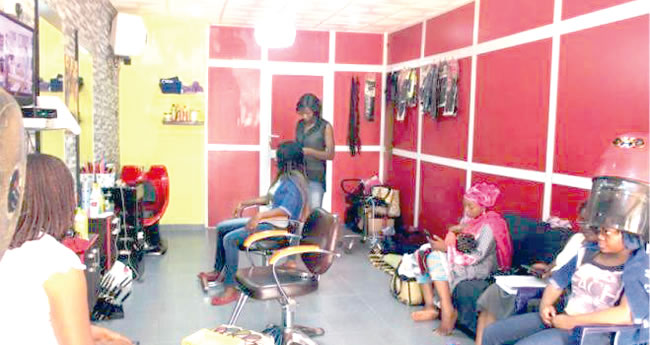
In this report, VINCENT KURAUN and YETUNDE AJANAKU delve into the challenges faced by hairdressers in Nigeria as they grapple with the implications of the skyrocketing pump price of petrol.
THE removal of petrol subsidy has, no doubt, had a complex and significant impact on businesses across various sectors of the Nigerian economy. While the government claimed the intendment of fuel subsidy removal was to address fiscal imbalances and promote efficiency, the ripple effects have created more economic imbalances and thrown many Nigerians into the widening poverty void.

In effect, businesses across all sectors are facing significant increases in their operating costs mainly due to higher fuel prices. This has since led to significant hike in prices of goods and services, reduced patronage and profits for business owners, potential job losses in some cases and further causing additional pressure on an already distressed economy.
It has been well established by business experts that small and medium-sized businesses are the backbone of most striving economies. The International Labour Organisation (ILO) even affirmed that small- and medium-sized businesses account for the majority of enterprises and employment in Nigeria. But today, in Nigeria, many of these small businesses are struggling to stay afloat.
The beauty sector used to be one of the thriving small and medium-scale businesses. Patronised majorly by women, the beauty and cosmetic sector provides huge employment opportunities for both men and women profiting from the desire of women and men to look beautiful. From make-up to hairdressing, the sector offers big businesses which, like many other businesses, are feeling the financial strain on their activities and operations.
Sharing her experience with Sunday Tribune, Nkechinyere Veronica Iwuji, a Port Harcourt-based salon owner, painted a grim picture of the sorry state of the beauty business. She blamed the situation on the escalating price of petrol which she depends on for her operations. According to IWUJI, the increase in petrol price has severely impacted her daily operations and overall business expenses.
“My business has not been doing well since the present administration started implementing policies that have led to increase in the pump price of fuel,” she narrated.
“Whenever a customer comes into the shop, the first thing you need to do is to power the generator since we don’t always have a reliable power supply. And presently, we are buying fuel at the rate of N1,300 per litre. N5,000 worth of fuel is not enough to do a good job, especially when you use your dryers. How much are we even charging our customers?
“Even when a customer offers to pay higher than the expected amount, it will still not be enough because of the quantity of fuel consumed by the generator; this skyrocketing fuel price is affecting my business. Almost all our services require power supply. Even for customers who come in for weaving, we still have to wash and dry the hair before weaving it. Though the time for drying might be shorter (between 10 to 15 minutes), it still has to do with fuel. But rolling and drying of hair consumes more fuel.
“Take for instance, I am changing you N1,500 to roll and dry your hair and I buy a litre of fuel at N1,300 from it, that litre will not be enough to dry the hair very well,” she said.
Speaking in the same vein, Mr Maseyi Olarenwaju, who has his business inside Gowon Estate, Ipaja in Alimosho Local Government Area of Lagos State, described what citizens and business owners are experiencing today as unimaginable, especially with the unreliable electricity supply.
He said: “The frequent power outages disrupt businesses in the country, limiting productivity. Yet, the next available source of generating electricity is gradually getting out of reach for small business owners.
“The cost of getting electricity that is not always available is also becoming too expensive. Before now, I used to pay around N250,000 as electricity tariff but since the increase in electricity tariff after which I was placed on Band A, my bill has increased to about N850,000 per month. How can the business recover after paying such?”
Segun Ayeni, a manager at the Next Unisex Salon located in the Egbeda area of Lagos, who also supervises Next salons in Alimosho area, disclosed that the daily operation cost has become crazy as a result of the money they spend on fuel to run their business.
“We used to expend 120,000 on fuel, but right now, we spend over N200,000. Recovering such expenses is even more difficult because of other higher operational expenses, which have also eaten deep into our profits and limiting our ability to offer competitive pricing to our clients and most times. That N200,000 fuel will not even last up to 10 days.
“The fuel price in the country is killing businesses. Take, for instance, the tariff on electricity in this area is very high. N800,000 worth of electricity can only take us for about four days. Because of this, we are not getting a huge turnover anymore but rather, we are just trying to survive and keep the business going,” he lamented.
Price adjustment
To cope with the huge operational costs, many businesses have had to adjust the pricing on their services. This, many of them said, is not a ‘Hail Mary’ as it only allows them to keep the business running because it is increasingly difficult to break even.
Speaking on price adjustments, Ayeni said the little differential in the cost of services has led to a litany of complaints from customers and clients.
According to him, “We have had to increase our prices slightly to cover the high expenses related to fuel and electricity.
“We only implemented just a little bit of increment in our prices, but we noticed that some of our clients complained seriously. We’ve even had to bring the price down a little so that we don’t lose our customers.”
He further explained that the increase in the cost of services affected customers’ demand to some extent, disclosing that “some of our clients are no longer frequent patronisers as they used to be. Some have chosen to have fewer hair treatments or services to manage their budgets. But some of our loyal customers understand that the price adjustment was a necessity and have continued to support our business.”
Explaining further, Ayeni said the important thing is transparent communication, adding that “by communicating transparently with our customers about the reason for the price adjustments, we have been able to maintain our customer base despite the changing economic condition.”
Also speaking on the adjustment in pricing, Iwuji said it was necessary to maintain her profit margins, even though price hikes are not necessarily good for the business at this time.
According to her, “I adjusted my prices a little bit, but this is still not enough to break even and mind you, customers are also complaining that the prices are too high. In order not to lose your customers, you just have to offer prices that will maintain your customer base.
“Currently, some of my regular customers do not come here frequently anymore, because they are also suffering the implication of this high fuel cost. So, what most of them now do is to wash their hair and dry it at home before coming to the salon in order to reduce the cost.”
Maseyi told Sunday Tribune that though he hasn’t increased his pricing, it still remains a plan if the economic situation becomes worse.
“Though I haven’t adjusted my prices, plans are on the way to do so. The reason is that we have already lost some of our customers except a few.”
Same situation everywhere
In Ibadan, the experience is not so different. A 35-year-old hairdresser from Bembo Apata Area, Mrs Omosalewa Alabi, opens her shop for business for 12 hour daily for six days, in order to stay afloat.
“I’ve worked 12-hour daily for six days in a week just to keep my business afloat,” she said. “But with fuel price soaring, I’m struggling to pay my staff, let alone me. People no longer make hair, they rather use wig. Some people only show up once in two months compared to what we used to have before.
Speaking in the same vein, a hairdresser from Mokola, Mrs Aminat Adekanbi, said: “The cost of everything is suffocating my business. Product prices have increased by about 30 percent. It’s not just products; cost of equipment maintenance, rent, and utilities have all gone up.
“I’ve tried to absorb the cost, but it’s getting impossible. I’ve already had to raise cost of services twice, and I’m worried I’ll lose clients. I feel like I’m drowning in expenses.”
A hairdresser/owner of David’s Hair Salon, Mrs Damilola Fatimehin, also disclosed that the last few months have been the toughest she has had to go through in her 20 years of doing the business.
“The cost of living keeps going up and so do my expenses. I’ve tried to raise prices, but clients are price-sensitive. I’ve had to cut back on staff and reduce hours. It’s taking a toll on my personal life. I’m worried about the future – will I have to close my doors?” she wondered.
Need for urgent intervention
Reflecting on how the beauty can survive the current situation, a beautician, Miss Grace Ayanlowo, said government would need to come to the aid of those in that sector by granting them soft loan to expand the scope of their operations.
The trio of Ayeni, Iwuji ad Maseyi spoke in the same vein, calling on the government to step in to alleviate the sufferings of business owners, particularly those in the beauty sector.
When asked if there are any government policies or support mechanisms that could help alleviate the burden caused by the high fuel prices, Ayeni said he was not aware of any but called on the government to formulate policies that would aid their businesses.
According to him, this can be done by seeking government support through subsidies, loan schemes, and policies aimed at stabilising the fuel market.
Similarly Iwuji and Maseyi called on the government to bring down the price of fuel so that small scale businesses can strive.
“People are hungry and are suffering. Running a business like this is no longer easy because of the bad policies of the government. We therefore need urgent intervention from the constituted authorities,” Maseyi pleaded.
READ ALSO: UK deports 44 Nigerians, Ghanaians in single flight — Home Office







